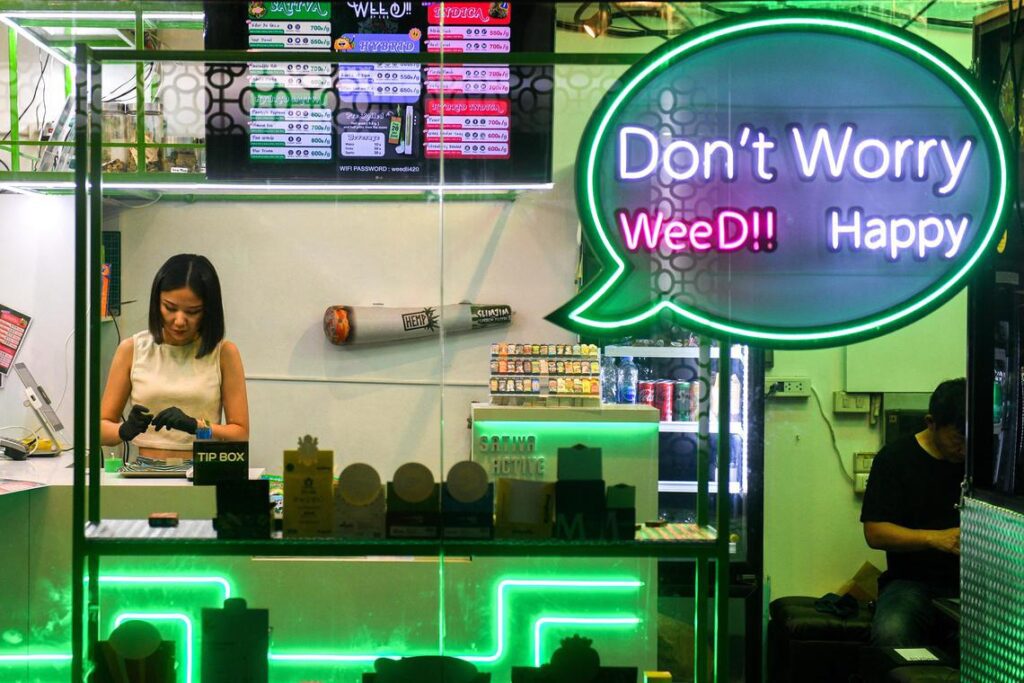In a significant shift for the region, Thailand has decriminalized cannabis, sparking a diverse range of reactions from its citizens. While many enthusiasts celebrate the change, health experts express concern, and local farmers face challenges from illegal imports that threaten their livelihoods.
The Situation Following Decriminalization
Since becoming the first Southeast Asian nation to embrace cannabis decriminalization, Thailand has witnessed a surge in cannabis businesses, particularly in popular areas like Bangkok. However, the lack of a clearly defined legal framework has resulted in complications, as necessary regulations remain unpassed in Parliament.
Political Implications
The issue of cannabis has become a heated topic in the lead-up to Thailand’s May 14 elections. Opposition parties have criticized the ruling coalition for hastily implementing decriminalization, which they argue may adversely affect youth and society at large.
- Opposition party Pheu Thai, loyal to former Prime Minister Thaksin Shinawatra, openly denounces marijuana.
- Health Minister Anutin Charnvirakul, who led the push for decriminalization, faces scrutiny over the failure to establish a regulatory framework.
Impact on Farmers and the Market
Disillusionment among farmers is growing, with many expressing frustration that promises of economic benefits have not materialized. Industry insiders point to a significant influx of illicit cannabis imports that have drastically reduced prices:
“Then the imported flowers started coming in,” said Kajkanit Sakdisubha, CEO of Taratera, reflecting on the challenges faced by local growers.
The Smuggling Crisis
Reports indicate that up to half of the cannabis sold in Thailand is smuggled, particularly from the United States. This influx has resulted in:
- Dropped wholesale prices, affecting profitability.
- Frustration among local farmers who invested heavily in the industry.
Srapathum Natthapong, a farmer who devoted his life savings to growing cannabis, reveals the steep price drop from 400,000 to 200,000 baht per kilogram, attributing the decline to imported product dominance.
Health Minister’s Stance
Health Minister Anutin, whose campaign once showcased marijuana as a lucrative cash crop, insists that importing cannabis illegally must be addressed rigorously. He stated:
“It’s illegal. If they are importing illegally, we will have to use law enforcement.”
The Future of Cannabis in Thailand
The Thai Chamber of Commerce estimates that the cannabis industry, including medicinal products, could reach a valuation of US$1.2 billion by 2025. Despite these optimistic projections, farmers like Natthapong feel disillusioned and are contemplating stepping away from the industry due to diminishing returns.
Comments from Industry Stakeholders
Chokwan “Kitty” Chopaka, a pro-cannabis activist, notes that U.S. cannabis products are particularly common in tourist hotspots. Meanwhile, Pornchai Padmindra from the Thai Industrial Hemp Trade Association highlights the struggles faced by growers:
“People are struggling. Things are becoming difficult.”
Political Accountability and Future Elections
As the election campaign intensifies, former political figure Chuwit Kamolvisit scrutinizes Anutin’s role in the cannabis landscape, questioning whether it truly serves as a sustainable cash crop for farmers:
“Is it a cash crop for farmers? No. Anutin must take responsibility as public health minister.”
With a backdrop of a once stringent anti-drug policy in Thailand, the current discourse suggests a contentious future for cannabis regulation within the political arena. Opposition leader Paetongtarn Shinawatra, daughter of Thaksin, has promised to restrict cannabis if elected, focusing on public health.
Conclusion
As Thailand navigates its evolving cannabis landscape, stakeholders on all sides are keeping a close watch. The combination of health concerns, political implications, and economic realities will shape the future of cannabis in the kingdom. The convergence of these factors will likely influence the outcome of the upcoming elections as citizens assess the promises surrounding this controversial cash crop.


